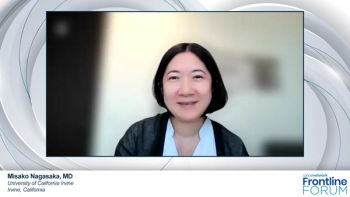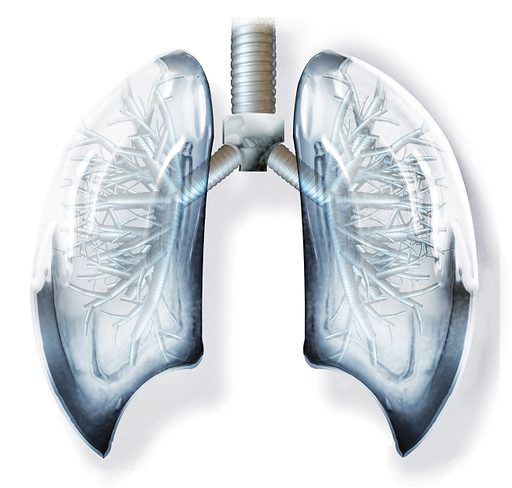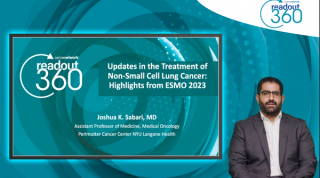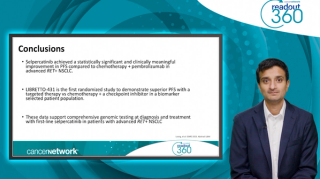
Non-Small Cell Lung Cancer (NSCLC)
Latest News

Latest Videos

CME Content
More News

Treatment with zongertinib produces low rates of EGFR-mediated adverse effects among patients with HER2-mutated non–small cell lung cancer in the phase 1a/b BEAMION Lung-1 trial.

Baseline characteristics do not appear to correlate with long-term benefits for patients receiving durvalumab plus tremelimumab and chemotherapy for metastatic non–small cell lung cancer in the phase 3 POSEIDON trial.

Findings from the phase 3 AEGEAN trial suggest that patients with EGFR-mutated non–small cell lung cancer experience similar outcomes whether receiving durvalumab or placebo.

Treatment with adagrasib appears to be particularly well tolerated in patients with KRAS G12C–mutated non–small cell lung cancer who receive it for more than 1 year.

Iruplinalib appears tolerable with no new safety signals among patients with locally advanced and metastatic ALK-positive non–small cell lung cancer in the phase 3 INSPIRE trial.

Data from the phase 2 EVOKE-02 trial support further assessment of sacituzumab govitecan plus pembrolizumab as a frontline treatment for metastatic non–small cell lung cancer.

Investigators report a progression-free survival benefit with osimertinib plus chemotherapy in EGFR-mutated non–small cell lung cancer across all subgroups in the phase 3 FLAURA2 study.

Experts discuss the current continuum of care for patients with EGFR exon 20 non–small cell lung cancer and findings from studies including the phase 2 CHRYSALIS trial.

Findings from a real-world cohort study may support renewed attention to completing molecular genotyping before first-line therapy for patients with metastatic nonsquamous non–small cell lung cancer.

Investigators report no new safety signals with alectinib as a treatment for those with early-stage, ALK-positive non–small cell lung cancer in the phase 3 ALINDA study.

Investigators report that Tumor Treating Fields and standard of care therapy should be considered as a treatment for non–small cell lung cancer in the metastatic setting.

Data from the phase 3 PAPILLON trial support the supplemental biologics license application for amivantamab plus chemotherapy as a treatment for EGFR exon 20 insertion mutation–positive non–small cell lung cancer.

Current treatment options for patients with EGFR exon 20 non–small cell lung cancer were discussed among a panel of experts in a recent Frontline Forum.

Patients with metastatic RET fusion-positive non–small cell lung cancer may now be treated with pralsetinib, which has been granted regular approval by the FDA.

The safety profile of selpercatinib in patients with RET fusion–positive non–small cell lung cancer in the phase 3 LIBRETTO-431 study is comparable with previous reports.

Findings from a previous phase 1/2a trial demonstrate that zipalertinib is a potential treatment option for pretreated patients with non–small cell lung cancer harboring EGFR exon 20 insertion mutations.

The fourth-generation tyrosine kinase inhibitor yields several partial responses and a tolerable safety profile in a small population of patients with EGFR-mutated non–small cell lung cancer in a phase 1 trial.

Confirmatory results from the phase 3 PAPILLON study further support the FDA approval of amivantamab-vmjw for patients with locally advanced/metastatic EGFR exon 20 insertion–mutant non–small cell lung cancer.

Findings from the phase 1b KRYSTAL-1 trial support the continued development of adagrasib in the treatment of patients with KRAS G12C–mutated non–small cell lung cancer and central nervous system metastases.

Shared insight on uncommon EGFR mutations in patients with non–small cell lung cancer and how they fit into the larger disease paradigm.


Treatment with tepotinib and gefitinib appears to be beneficial compared with chemotherapy in a MET-amplified subgroup of patients with non–small cell lung cancer.

Datopotamab deruxtecan produces no new safety signals among patients with locally advanced or metastatic non–small cell lung cancer in the phase 3 TROPION-Lung01 trial.

A pair of experts explore the expanding treatment landscape in non–small cell lung cancer for patients with EGFR exon 20 insertion mutations.

An updated analysis from the phase 3 ADAURA trial reports no significant changes in osimertinib’s safety profile in non–small cell lung cancer since the primary analysis.











































